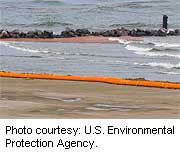
WEDNESDAY, June 9 (HealthDay News) — Now that oil and tar balls from the massive Gulf oil spill have begun washing up on the beaches of four states, many are wondering: What, if any, are the health risks to beachgoers and residents of the region?
While the danger to humans may be not nearly as bad as pictures of oil-soaked pelicans would suggest, experts are divided on just how concerned people should be.
Miriam Rotkin-Ellman, a staff scientist with the Natural Resources Defense Council, said beachgoers shouldn’t be complacent. Clean-up workers and even some coastal residents, she said, are complaining of symptoms consistent with exposure to the volatile compounds found in oil, including dizziness, nausea, headaches and cough.
Those reports should be taken seriously, Rotkin-Ellman said, who noted that crude oil contains toxic and cancer-causing chemicals.
“There are definitely human health concerns related to the Gulf Oil spill, both in terms of workers, the community and long-term health concerns as contaminants persist in the environment,” she said.
Not all experts agree that the spill poses a danger to the public at Gulf Coast beaches.
Data from the Occupational Health & Safety Administration (OSHA) show that clean-up and repair workers in the Gulf of Mexico near the spill have not been exposed to harmful levels of toxins, said Robert Emery, vice president for safety, health, environment and risk management at the University of Texas Health Science Center at Houston. This confirms data from BP, the owner of the crippled oil rig that has spewed countless barrels of crude oil into the Gulf since an April 20 explosion that killed 11 workers about 40 miles off the Louisiana coast, Emery said.
Federal estimates place the total amount of oil spilled between 23.7 million and 51.5 million gallons, the worst oil spill in the nation’s history.
If workers near the source of the spill don’t seem to be in harm’s way, then it’s safe to presume that the oil reaching the shores of Louisiana, Mississippi, Alabama and Florida isn’t much of a risk to beachgoers and residents, Emery said.
“The people you’d expect to be most intimately exposed to the chemicals contained in crude oil are those working on the water near the source of the leak,” Emery said. “Now we have data not only from BP but OSHA that shows these worker exposures are minimal if not non-existent. That’s good news and it’s safe to assume the risks would be even less for the general public on the beaches.”
Rotkin-Ellman disagreed, noting that much also remains unknown about the health effects of the massive amounts of chemical dispersants used to fight the spill that break an oil slick into small drops.
On one point experts agree: Beachgoers need to exercise common sense. That means avoiding swimming in water that’s visibly contaminated by oil.
Crude oil contains many toxic chemicals, including volatile and semi-volatile organic compounds, Rotkin-Ellman said. Those compounds include benzene, ethylbenzene, xylene and naphthalene, all known carcinogens, she said.
While dangerous if ingested or inhaled, these chemicals tend to dissipate and evaporate over time, experts said. Research shows that the toxic potency of crude oil declines the longer the oil is floating in the water or in the air, a process called “weathering,” Emery said.
Still, beachgoers can’t tell on their own if the oil they encounter is fresh or has been floating around awhile, Emery said.
Before heading to the beach, Emery said it’s a good idea to check with local or state authorities about health conditions.
Rotkin-Ellman said parents should be especially cautious about exposing children to oil-soiled beaches.
“Children’s bodies are more vulnerable and susceptible to environmental contaminants,” she said. “Their bodies don’t process contaminants in the same way. Their skin can be more sensitive to the chemicals in oil. Certainly I would recommend keeping children away from any oily substance or oily water.”
If you do encounter tar balls or oil slicks, don’t touch them. Fresh crude oil is a skin irritant that can cause redness, burning and even ulcers with prolonged contact. Though the oil washing up on the beaches probably isn’t as harsh, it’s still a good idea to keep it off your skin, Emery said.
Oil tar is sticky and difficult to remove. If soap and water don’t work, try petroleum jelly or a commercially sold de-greaser that’s made to be used on the skin. People have been known to use gasoline to remove tar from their skin — a bad idea all around, Emery said.
If you do smell fumes from an oil spill, people with respiratory ailments and asthma should stay indoors with the air-conditioner set on “re-circulate,” Rotkin-Ellman said. The chemicals can irritate the eyes, nose and throat even at low concentrations.
And, by all means, report the odor to health authorities.
More information
The U.S. Centers for Disease Control and Prevention has more on the oil spill and health.

